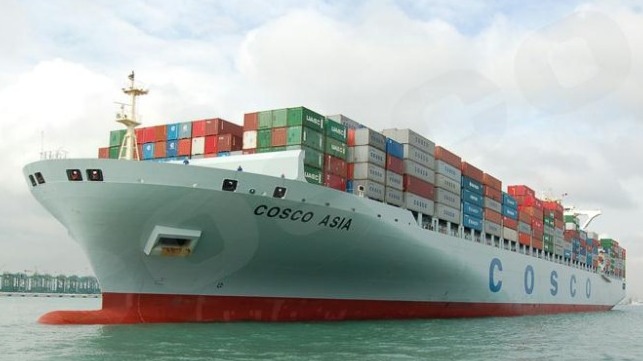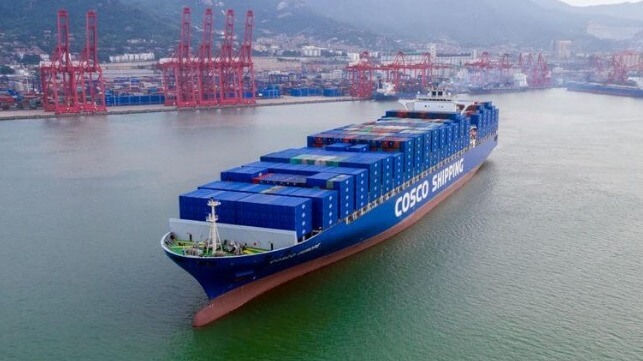China and COSCO Lash Out Over U.S. Listing of Military-Related Companies

The Chinese government and COSCO Shipping responded to the U.S. Department of Defense’s inclusion of the company among the 134 organizations listed for ties to the military. The Chinese government continued to blame anti-China sentiments in the U.S. while calling for fair treatment for its companies while COSCO said it would “engage with U.S. authorities to clarify the matter.”
The U.S. Department of Defense was mandated by Congress in 2021 to start compiling and releasing a listing each year of companies it believes are supporting China’s military. The listing of so-called “Chinese military companies” carries no specific penalties, but is used to discourage U.S. businesses from working with these companies. The Pentagon can not do business with companies that are deemed to be supporting the Chinese military.
COSCO, which is the world’s largest shipowner, was added to the listing that was released yesterday, January 7. It joins other well-known Chinese companies including China State Shipbuilding Corporation as well as the manufacturer of shipping containers.
COSCO North America issued a mostly boilerplate statement about consistently adhering to local laws and regulations and maintaining strict compliance in all international operations. In the statement, it said none of its companies (COSCO Shipping, the North American division, and COSCO Shipping Finance which were each listed) are Chinese military companies.
A spokesperson for China’s Ministry of Commerce when asked said they had “noted” the listing while calling on the U.S. to respect facts and stop “discriminatory treatment to Chinese companies.” He said, “China is strongly dissatisfied with and firmly opposes,” the listing of the companies.
The Ministry of Commerce asserted that the U.S. “continued to generalize the concept of national security,” and “groundlessly accused China of its ‘military-civilian integration’ strategy.
China it said, will closely follow relevant developments and take all necessary measures to resolutely defend the legitimate rights and interests of Chinese companies.
China’s COSCO Shipping Listed by U.S. for Links to Chinese Military

The U.S. Department of Defense published its annual listing of companies linked to China’s military adding shipping giant COSCO Shipping and two of its subsidiaries, as well as other companies including the Chinese oil company Cnooc, to the designation. The associations between Chinese companies and the military have long been reported but this step formalizes the designation in an effort to discourage U.S. involvement with the companies on the list.
The National Defense Authorization Act for Fiscal Year 2021 included the requirement for the annual listing. Written by Congress, the subsection requires the Secretary of Defense to identify and publish a list of “Chinese military companies” annually. DoD published today, January 7, the notice of the annual listing in the Federal Register.
The Pentagon reviews the companies and sets the criteria for what entities qualify as “Chinese military companies.” The U.S. government is barred from doing business with those companies and the publication is meant to expose the companies. Congress’s goal was to discourage private companies from working with companies on the list.
It is not the first time COSCO, which calls itself the world’s largest shipowner, has come under scrutiny by the U.S. government. The first Trump administration in 2019 briefly sanctioned COSCO’s tanker operator for transporting Iranian oil. The sanctions however were removed the following year.
In addition to COSCO Shipping, the new listing includes COSCO Shipping (North America) and COSCO Shipping Finance Co. Cnooc was also included on the list and joins others including China State Shipbuilding Corporation which had already been cited. Among the total 134 companies listed are also China International Marine Corporation, the manufacturer of shipping containers, and China Shipbuilding Trading Co., a CSSC subsidiary used to promote Chinese shipbuilding globally. CATL, the leading battery manufacturer is also on the list.
It has long been asserted that China uses the commercial industry to support its military. COSCO transports military goods and CSSC is the builder of vessels of China’s Navy. Among its projects are China’s new aircraft carrier and it recently launched the world’s largest amphibious assault ship.
Increasingly elements of Chinese industry have been coming under scrutiny. In March 2024, five U.S. unions formed an alliance filing a trade complaint to challenge China’s shipbuilding industry. The U.S. Senate also held subcommittee hearings on China’s shipbuilding industry. The pressure for action against the shipbuilding sector continues to grow as China expands its dominance in the global orderbook for new ships.
A bipartisan group of U.S. Senators and members of the House of Representatives in December 2024 introduced the SHIPS for America Act calling it the first comprehensive effort to revitalize the U.S. merchant marine. Key elements focus on China and Chinese shipping. In addition to Trump’s proposed tariffs on Chinese goods, the act would create a requirement to transport 10 percent of Chinese goods on American ships and add tariffs on Chinese shipping.
Today’s action by the Department of Defense, however, is seen largely as symbolic. It solidifies the designation of the association between Chinese industry and the military. Analysts have long said those ties existed in all parts of Chinese industry.
No comments:
Post a Comment